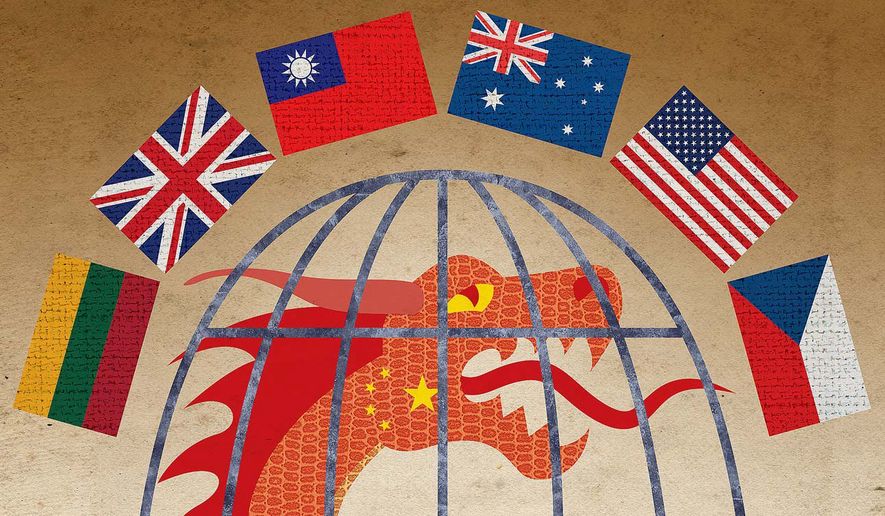OPINION:
President Biden’s industrial and trade policies have proved to be a lightning rod.
Economists, pundits and the media — on the left and right — complain that these will promote inefficiency, alienate our allies and fail to address fundamental disadvantages holding back manufacturing and innovation in the United States.
This is both right and wrong.
A lot will depend on the implementation of the CHIPS and Science Act and Inflation Reduction Act, which offer subsidies and loans to promote scientific research, domestic production of alternative fuels such as hydrogen and solar power, and the decarbonization of the U.S. economy through electric vehicles, heat pumps and the like.
Recognizing the security challenges posed by China, the incentives are designed to promote hardened supply chains for state-of-the-art computer chips and batteries — from critical materials to packaged semiconductors for industry applications, storage for electric utilities and building electric vehicles.
These are critical to the U.S. achieving net-zero carbon emissions by 2050 under the Paris Agreement. Those are at loggerheads, however, with U.S. commitments under the World Trade Organization but not necessarily with U.S. bilateral and regional free trade agreements.
For example, the Inflation Reduction Act offers tax credits of as much as $7,500 for the purchase of an EV if it is assembled in North America and its batteries contain at least 50% North American content. That will rise to 80% by 2027.
As with computer chips, this will be more costly than sourcing components from China. But the Biden administration counters that Chinese national champions benefit from all manner of tax benefits and other subsidies.
Progressive analysts reasonably argue that much of the Middle Kingdom’s cost advantages for essential materials like nickel, lithium and cobalt result from lax worker and environmental protections.
Those considerations, along with the security risks of relying on China, are ignored or discounted in the critiques of Mr. Biden’s industrial policies by mainstream economists.
The general exclusion of the European Union and other allies from the tax credits and other financial benefits is inspiring them to similar policies.
The fundamental problem is that Chinese trade and industrial policies are hardly consistent with the letter or at least the intent of WTO agreements, and the latter’s dispute settlement mechanism has proved impotent.
Consequently, the best alternative is to encourage Europe, Japan, South Korea and others to ramp up similar programs and for the United States to cooperate with them.
This column has argued that a free trade system built outside the WTO — for example, anchored in the Trans-Pacific Partnership — would be highly desirable for addressing the predatory economic consequences of China’s mercantilist policies and the security threats posed by its ambitious military buildup, saber rattling toward Taiwan, and territorial claims in the South China Sea and elsewhere.
Moving in this direction, the United States recently negotiated a national treatment agreement with Japan for the production, processing and recycling of materials for making batteries. U.S. negotiators are moving toward a similar agreement with the EU, and this approach should be expanded to other allies.
This is hardly U.S. accession to TPP, but trade policy is not made on the blackboards of economics classrooms. It must recognize political constraints and that, too often, economics is inadequate to evaluate the social costs and security risks associated with unbridled international commerce.
Mr. Biden’s commitment to weighing the impacts of trade policy on domestic workers is too extreme. For example, he has rebuffed U.K. overtures to negotiate a free trade agreement and a technology cooperation agreement. It’s hard to fathom how U.K. working conditions and expanded cooperation and commerce with our strongest strategic partner would pose risks to American workers — other than fair competition.
That’s the rub.
Organized labor came out against the recent agreement with Japan. It wants the United States to extend national treatment for only five minerals that cannot be produced here.
Such a generalized approach would dramatically lower the U.S. standard of living.
Quite apart from the policies pursued by the Trump and Biden administrations, aggressive Chinese government actions in recent years to bring the private sector under tighter control and supply chain disruptions caused by COVID-19 are inspiring American businesses to diversify sourcing.
A comprehensive analysis by DHL indicates that globalization is not going away. Rather, linkages are changing.
U.S. trade and investment continue to grow with China, but more slowly as American multinationals establish relationships elsewhere — again supporting the idea that joining the TPP could promote U.S. prosperity and security interests.
If Mr. Biden is reelected or a GOP candidate reflecting the preferences of Trump supporters captures the White House in 2024, U.S. accession to the TPP is unlikely.
In the meantime, a network of national treatment agreements to build out secure supply chains in alternative energy, chips, EVs and other industries that foster competitive specialization along the lines of the U.S.-Japan Critical Materials Agreement would be a good second-best approach.
• Peter Morici is an economist and emeritus business professor at the University of Maryland, and a national columnist.




Please read our comment policy before commenting.